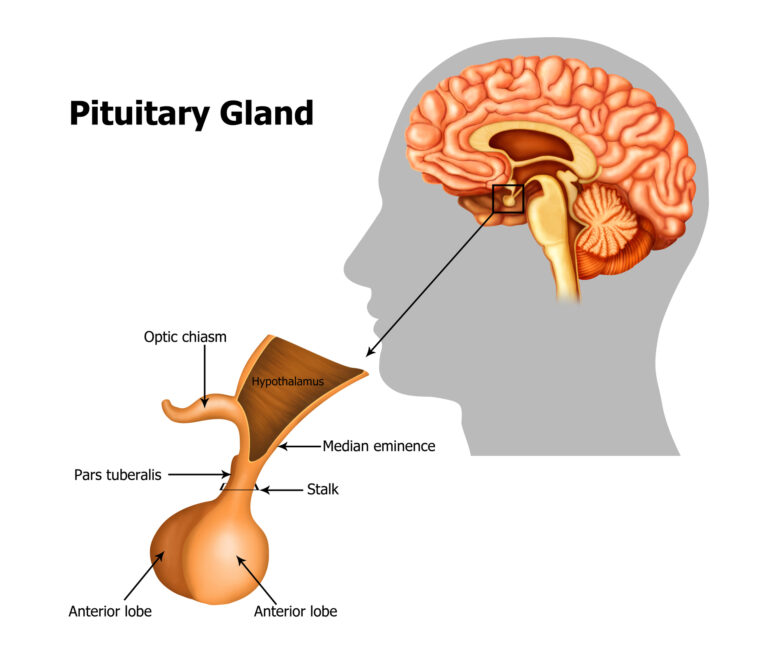The pituitary gland rarely gets any consideration in conventional medicine, unless it is diseased. Yet the pituitary gland is so extraordinary, that it is considered the “Master Gland” because all the other endocrine glands are dependent upon its secretions for stimulation. The pituitary secretes a number of hormones (chemical messengers which dictate organ function). The pituitary is located in the brain and is about the size of a pea. Although the pituitary is considered the Master Gland, it is controlled by the hypothalamus. There are two lobes to the pituitary, each of which produce different hormones.
The pituitary hormones control the adrenal hormones (cortisol – anti-inflammatory hormones), the thyroid (TSH numbers in a lab test shows how much Thyroid Stimulating Hormone is released trying to get the thyroid to work), it is important in sexual function – it controls ovaries to produce estrogen and progesterone as well as telling the testes to produce testosterone and sperm. It also controls other sex hormones such as LH (Lutenizing Hormone) and FSH (Follicle Stimulating Hormone). Pituitary hormones stimulate the breasts to produce milk; through Growth Hormone stimulates growth and repair of all cells in the body; effects skin pigmentation; regulates heart rate and blood pressure; controls the kidneys’ ability to control blood fluid and mineral levels in the body via fluid balance; and effects uterine contractions during the birthing process; and has a profound influence on emotions. The pituitary in concert with the pineal gland also regulates our sleep. I’d say this is a pretty important gland! Why don’t we pay more attention to it?!
So, here, we will. There is much we can do to keep (or create) a healthy pituitary gland. It starts with good nutrition. The pituitary gland is dependent upon various vitamins and minerals to function well. These include: iron, iodine, magnesium, manganese, potassium, calcium, and Vitamins A, D and E (which means you also need good fats in the diet in order for the body to utilize these fat-soluble vitamins); and good sources of protein.
Good foods to consume include whole grains, fruits and vegetables high in antioxidants, especially cherries, tomatoes, leafy greens, pumpkin, spinach, carrots, bell peppers, broccoli, and sweet potatoes. Quality salts with the full mineral spectrum in them is important as well.
The pituitary gland also responds well to certain exercises. Walking 20-30 minutes/day increases blood flow to your pituitary gland. Yoga exercises such as hand stands, Forward Bend, Triangle Pose, Seated Wide Leg Forward Bend, and Child’s Pose, are all postures that have shown benefit to the pituitary. Pushups and stretching regularly can also be helpful.
There are several herbs, as well as pituitary glandulars that are helpful in restoring healthy function. There are also damaging consumables. In a 2009 Brazilian study, they discovered that not only did Genetically Modified foods (GMO) alter reproductive hormones, but also damaged the pituitary gland. Simple avoidance of GMO’s is helpful here. Also, caffeine hyper-stimulates brain neurons, setting into action an emergency signal (“fight or flight”), which effectively shuts down functions such as digestion and immune function (and many others).
While the pituitary commonly gets little attention, there is much we can do to help with healthy functioning, thereby supporting this extraordinary gland and the health of many aspects of bodily function.
© 2013 Holly A. Carling, O.M.D., L.Ac., Ph.D.







